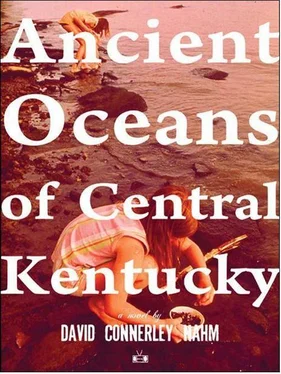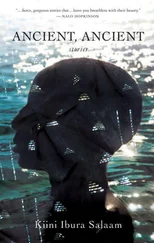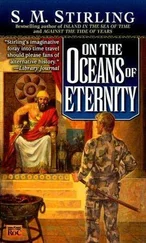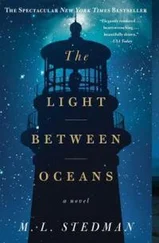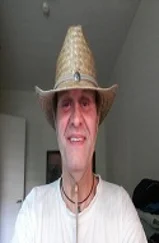Outside of the window of her office a tall woman with filthy hair walked by, but Leah, in a reverie, didn’t notice her. The caw of the telephone on her desk, the red light of line three trilling, brought her back from wherever she’d been and her hand went to the nape of her neck when the wind rattled the drafty windows of the old office or when it called to her through the trees. There was a birthmark in the shape of a crab underneath her hair, hidden by crimped tresses. In the meetings she nodded and sighed over the names and numbers. In the kitchen, late in the afternoon, the receptionist, a widow who boarded college students in a basement apartment, rank with mildew, said, as she poured a cup of decaf and cut a comically small piece of pound cake that someone had brought the day before, “I didn’t know you have a brother.” Leah looked up from the window, startled, and said, “He passed away.” The receptionist apologized and said she’d put a call through for Leah’s voicemail, but must have misunderstood what the man said. When Leah returned to her office there wasn’t any message.
When she was thirteen, her parents took her to the beach. Just the three of them. She didn’t like to go in the water. Rather, she preferred to sit in the sand and build elaborate drizzle-decorated castles around her legs, though her mother told her she was too old. “Honey, you’re too old for that,” her mother would say. “Don’t you want to get in the water? Or go to the arcade on the pier? I’ve got quarters.” Every time the water would creep closer and closer and eventually suck the sand away from between her legs. Even when she built a dam with her interlaced fingers to catch what she’d built, it would slither through, taking the dam with it. Coquina clams nibbled at her skin. One evening her father walked her to the arcade at the pier, her shorts heavy with quarters dredged from her mother’s purse. They didn’t talk as they walked along and when they got there, he left her by the bright door of the gameroom and walked down to the end of the pier by himself and looked out at the rising night. Leah stood with the crazed moths in the glow of the lights by the door and watched the teenagers furiously pounding buttons and wrenching joysticks back and forth, desperate to elude the paths of increasingly erratic ghosts. Some boys wearing nothing but swim trunks, their hair matted with dried salt around their ears and broken-out foreheads said something that she did not hear and began to laugh at her. Their voices battered at the lights. From where she stood, she could not see her father at the end of the pier and she must have begun to cry because the boys were howling at her tears. She did not like to go into the water and she did not like to go to the pier. Leah preferred to stay in the sand.
There was more than one stream in more than one wood, more than one wall of sand around more than one pair of legs, more than one woman watching rainwater erode the banks where she walked. Leah worried about this until late at night, eventually falling asleep on the couch. The radio station fell to static.
At the Harrod County Fair, Leah Shepherd and her little brother Jacob waited their turn to ride the rusted Zipper. Their father was somewhere in the shadows on the other side of the contraption, waiting for his children. Cars flipped and spun in the dark, the machine flashing red and white, children moaning, pleading to be let off, causing a filigree of laughter from below.
By the gate to get onto the ride, boys in pegged jeans and sleeveless t-shirts spat onto the straw-covered ground. “Wanna come with us?” one asked as the others stalked and hunched in the glitter of the ride’s light, but Leah declined, unnerved by the boys’ open stares, by the boys’ glistening foreheads and erupting cheeks. She searched the dark for some sign of their father, but he’d wandered off. Jacob was dazzled by the figures capering in the din and squeezed his big sister’s hand.
The boys howled. In their pockets, eye droppers of gin. They skipped to their car with eyes wide open and sped into the night, down gray country roads, grieving over nothing they could name, beating the dashboard with their fists. Near dawn they broke into a cemetery and pissed on the first angel they could find.

Leah Shepherd waited in her car for the light to change to some other color so she could continue her short drive to work. Her morning’s mouth yawned and she checked her cell phone, but there weren’t any messages. A gaggle of girls crossed in the crosswalk and the radio announcer said, Go ahead, caller. Hello? Go ahead. Are you there? Caller? Dew limned lawns with the new sun. The light changed, but still she waited for a filthy-looking woman carrying a battered backpack to cross in front of her. She waited, then she went, and the radio cut to commercial.
In the thin trees by the stream, an empty lighter, ruined clothes, and a tarp up on branches to keep it all dry.
Leah spent the morning reading the Internet and avoiding people telling her how nice the picture of her in the newspaper looked. She smiled and said, “Thank you,” but inside wished that no one would say anything. Not that the award meant much. It was a cheap plaque engraved at the local sporting goods store, the kind of thing that local Chambers of Commerce give out by the bushel, and it had only been published because the Crow Station newspaper had temporarily run out of stories about stray dogs in the library or new appliance stores opening on the bypass.
A few days later, as she was on her way out the backdoor to lunch, the receptionist buzzed her office and said that a man was here to see her. He didn’t have an appointment and wouldn’t say what his business was. Leah didn’t recognize his name, but assumed he was the husband or boyfriend or father of one of the poor women she was working with, and having no desire to deal with whoever it was, having already spent the morning with a woman with two little children who would not stop fighting with one another, no matter how many times the woman promised that she would switch them, Leah told the receptionist to tell the man that she wasn’t available and slipped out to lunch. Despite this, the man found her where she was eating. “Leah?”
Even in the most long and lovely days of summer, Leah and Jacob Shepherd were content to laze indoors, reading or watching television or wrestling perilously close to the top of the stairs. At her wits end, Mrs. Shepherd would shoo them outside where their indoor irises would scream in outdoor light. “It is too pretty to stay inside,” she would say, remembering how she’d spent summer nights sleeping in tall grass with her sisters.
The yards of the houses on their street were cluttered with trees, the trunks of which were dressed in soft gowns of moss. The trees crowded so thick that most of the houses were completely hidden from the street, only their crumbling walks disappearing on their way to dim doors still visible to Leah and Jacob. They sat outside in their backyard, the sun napping on their skin and Jacob would ask Leah to tell him a story and Leah would warn him that she only knew scary stories and he would promise not to get scared this time and she would tell him, knowing full well that he would quickly become too terrified to listen to more. She grinned as the horror slowly began to creep across his face and at her own ability to conjure gore that was still, at ten years old, only speculative to her.
The voice of the breeze and a click-clack of boxcars at the edge of town. The all-invading wafts of stock-yard stalls. Wind rattles oak and sumac. A mackerel sky, and thus, three days dry. When the sun sets, there will be ribbons of pink.
Читать дальше
